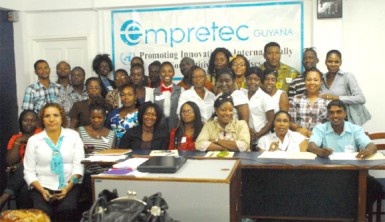It may not have been a ground-breaking event in the context of providing training for micro and small business owners, but this week’s three-day training session for business owners and potential business owners marks the partial fulfillment of a commitment made by the Small Business Bureau to those entities seeking to sign up to benefit from what the Bureau has to offer.
This week’s exercise saw 34 small and micro business operators and potential operators receive instructions in the preparation of business plans.
Up to a few years ago a forum of this nature may have been virtually unheard of. Over the years, many local small and micro enterprise owners have played by their own rules, some of them ignoring altogether the orthodoxies associated with starting and running a business. Much of that has changed. These days, running a business, even the smallest micro-enterprise, without a plan of sorts, is not recommended.
EMPRETEC was contracted by the Bureau to deliver the training programme and the agency’s Manager Karen Raphael says that what the kind of orientation offered by the programme seeks to do is to help the participants make a clear distinction between “a hustle” which so often characterizes small businesses and a serious business.

The programme’s Coordinator, Denise Bentick concedes that taking the business aspirants ‘to school’ can be challenging though she says that the rules and procedures associated with doing business render the process necessary. Bentick says that even for the most modest of enterprises a business plan is an essential step by step guide to running a business that establishes clearly defined procedures and demands a particular approach on the part of the business owner.
Most of the 34 participants in this week’s training programme have been involved in one form of business or another. They are, however, being introduced to what is perhaps best described as the next level.
Chief Executive Officer of the Small Business Bureau Derrick Cummings says that the training which is being afforded those persons who have signed on with the Bureau is designed to help them honour their commitment to the project. Cummings says that bearing in mind that part of the focus of the project is on ensuring that the funds allocated to the Bureau under the first phase of the US$10 million Micro and Small Enterprise Development and Building Alternative Livelihoods for Vulnerable Groups Project are well spent. The project’s other concern, he says, is with ensuring that those persons on the Bureau’s books, who might engage a commercial bank, possess the requirements for doing business with the bank. “The bank will certainly want to see evidence that a potential borrower has some clear sense of direction as far as doing business is concerned and I believe that it makes a significant difference if they are able to present a business plan.”
Old habits die hard and the sub-culture of what Raphael describes as a “hustle” persists. Some small and micro enterprise owners are still able to circumvent the strictures associated with commercial bank loans by accessing less procedurally demanding arrangements that might include borrowing from relatives and friends.
Be that as it may Bentick says business plans serve purposes that go beyond simply satisfying banks’ lending requirements. She says business plans amount to a kind of rudder that steers a business. “More and more we are trying to get people to document what they intend to do so that a determination can be made as to whether they are following their own plans,” she said.


A lack of appetite or aptitude for “writing” apart, Bentick says there are other reasons why “small operators” are sometimes reluctant to create any kind of paper trail. “Sometimes it is a matter of them being concerned about their information falling into the wrong hands. Some of them are concerned about the tax man.”
Still, Bentick says that there is no escaping the importance of planning. She provided a “simple example” of a small business operator experiencing cash flow problems arising out of an ill-conceived approach to granting credit facilities to customers which overlooked his own liquidity considerations.
Bentick says that teaching small business operators how to prepare business plans is a task that requires particular skills including those associated with presenting material. “You have to ensure that you stay as far as possible from a completely formal setting. You also have to deliver material in a manner that causes participants to create linkages between what is being taught and the development of their respective businesses.
Raphael told Stabroek Business that since, in many cases, financing was “the gap between successful businesses and unsuccessful ones it was important that the programme help position participants to narrow that gap by being better equipped to access financing.”
What the MSE project does is to create contracts between the Bureau on the one hand and small and micro business owners and aspirants on the other. For its part the Bureau commits itself to providing those business hopefuls who have signed on to the programme with grants and loans as well as access to commercial bank lending. What the Bureau asks in return is that the business hopefuls cultivate practices that better position them to create and develop successful businesses. That, in large measure, is what this week’s training programme was about.




